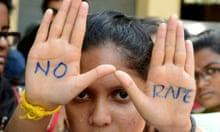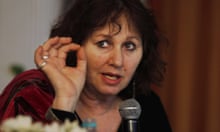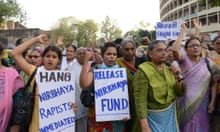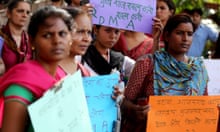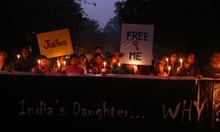A controversial documentary on the gang-rape of a young woman in Delhi has been aired by the BBC despite protest from the Indian government.
The film, India’s Daughter, was due to be aired on International Women’s Day on Sunday but was brought forward to Wednesday evening. Delhi refused to allow it to be shown in India because it objected to the film-makers releasing it without their approval.
The BBC defended the broadcast, which seeks to explore the crime and the cultural context in which it was committed. A spokesman said it provided a “revealing insight into a horrific crime that sent shock waves around the world and led to protests across India demanding changes in attitudes towards women”.
In the film Sheila Dixit, the former Delhi chief minister, said women are undervalued in some parts of Indian society. “Many people grow up thinking that the girl is less important than the boys. And, because she is less important, you can do what you like with her,” she told the Storyville programme which aired on BBC Four.
Mukesh Singh, who drove the bus on which the woman was raped and murdered, appears in the film, unapologetic for his crime. He told the film-maker Leslee Udwin: “A decent girl won’t roam around at nine o’clock at night. A girl is far more responsible for rape than a boy.”
In a revealing interview, he added: “When being raped, she shouldn’t fight back. She should just be silent and allow the rape. Then they’d have dropped her off after ‘doing her’, and only hit the boy.”
Details of his crimes were read out to him but he showed no regret, Udwin has written.
A prison psychiatrist who examined the rapists said India’s jails hold men who have committed more than 200 rapes in their lifetime, while only being convicted for around a dozen.
A lawyer for the rapists, who himself has said that he would burn his own daughter alive if she brought shame upon herself, claimed that many sitting MPs had committed similar crimes, but had not yet faced trial. In order to change society, India’s leaders should “start with their own necks”, he said.
The programme gave an insight into the savagery towards the victim and the producers spoke to some prominent members of the protest movement that sprang up as a result of it.
According to Justice Leila Seth, “the rape was extremely brutal and it’s something very unusual to find that you not only rape the girl, but you put an iron rod and take out her entrails. I mean, this is something I can’t understand; what kind of human beings are these who do something like that?”
The victim was travelling on a bus with a male companion after going to see a film together. The gang challenged them as to why they were travelling together at night. The male companion was beaten, before she was repeatedly raped. After attacking her with the iron bar, the gang threw the pair from the bus.
The producers spoke to her grieving parents, who talked about visiting their badly-injured daughter and seeing her die.
Four of the men await the outcome of a final appeal and face the death sentence, a fifth committed suicide in prison, while a juvenile convicted over the gang rape and murder is due for release in December this year.
Family and friends of the victim said they wanted to see justice done. But, according to Singh, the death penalty they have been given “will make things even more dangerous for girls”.
He said: “Now when [criminals] rape, they won’t leave the girl like we did. They will kill her. Before, they would rape and say, ‘leave her, she won’t tell anyone’. Now, when they rape, especially the criminal types, they will just kill the girl. Death.”
A BBC spokesman said: “This harrowing documentary, made with the full support and cooperation of the victim’s parents, provides a revealing insight into a horrific crime that sent shock waves around the world and led to protests across India demanding changes in attitudes towards women.
“The film handles the issue responsibly and we are confident the programme fully complies with our editorial guidelines. The documentary has the backing of a number of other public service broadcasters, however the BBC is only responsible for transmission of the film in the UK.”

